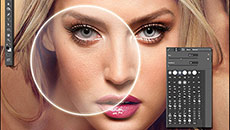The number of hours we spend exposed to blue light make it a true concern for our health and wellbeing.
As the summer winds come to an end and our focus shifts from fun in the sun to getting back to the grind, it is the perfect time to also shift our thinking about how we protect our eyes. In the summer months, we are all aware that UV rays from sunlight can be harmful to our eyes, so we put on our favourite pair of stylish shades and head out into the world knowing that we’re doing the right thing for our eye health (while also looking great, of course).
But, as the seasons change and we all head back to school and work, we will be spending far less time outdoors and far more time being exposed to a different type of light that can also be detrimental to our eyes. The screens on all of the digital devices we commonly use throughout our day (phones, tablets, computers or flat screen TVs) emit a type of high energy light which is often referred to as blue light.
High energy blue light is actually all around us and the largest source of it is sunlight. In fact, because these short-wavelength rays scatter more easily when they travel through air and water, blue light is actually what makes the sky look blue.

Blue light is also quite essential to our health. Studies have shown that exposure to blue light is important in regulating our circadian rhythm (our wake and sleep cycle). In this way, it helps boost alertness, helps cognitive ability, and elevates mood. However, our use of computers and digital devices has brought us much closer to artificial sources of blue light, and the number of hours we spend exposed to blue light on a daily basis make it a true concern for our health and wellbeing.
From a visual comfort perspective, blue light is quite disruptive. Because high energy light scatters more easily than other visible light, it is not as easily focused by our eyes. This can lead to digital eye strain, which can result in fatigue, blurred vision, and headaches. The effects of blue light on our health can be wide-ranging. The primary concern, as researchers at Harvard and many other institutions have shown, is that increased exposure to blue light in the evening can cause lack of sleep, which can ultimately increase the risk for significant health concerns such as depression, diabetes and cardiovascular problems.

What can we do?
With our work and personal lives progressively becoming more immersed in the digital world, it is hard to recommend a complete ban on digital devices. However, the simplest thing we can do to improve our visual outcome is to decrease unnecessary screen time. This step is particularly important for the younger generation. The Canadian Association of Optometrists and the Canadian Ophthalmological Society recently released a joint statement recommending no more than two hours of recreational screen time for children aged five to 18.

For those of us who have no choice but to spend time in front of screens, there are ways through which we can more actively protect our eyes against the harmful effects of blue light. Advances in optical lenses have provided a great new option to help us literally filter out the high energy light that would otherwise penetrate the front of our eyes and potentially result in digital eye strain. These lenses, which we generally refer to as blue-blocking or blue-filtering lenses, are a great option for anyone (young or old) who spends time in front of screens. These lenses can be used in prescription glasses or even as non-prescription computer glasses and are an easy way to protect your eyes from the effects of high energy light.
As we continue to integrate digital devices into various facets of our lives, it is vital to remember the potential effects these new technologies can have on our health. Protecting our eyes today can allow us to preserve our vision in the future.

ABOUT THE AUTHOR
Dr. Harbir Sian graduated from the New England College of Optometry 2010. Dr. Sian is the co-owner of Highstreet Eyecare in Abbotsford and Clarity Eyecare in Surrey. He also posts eye-related videos and blogs on his website AboutMyEyes.com

